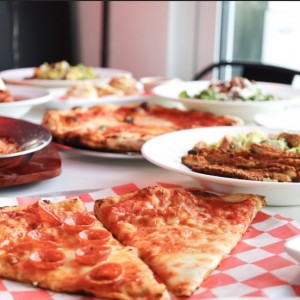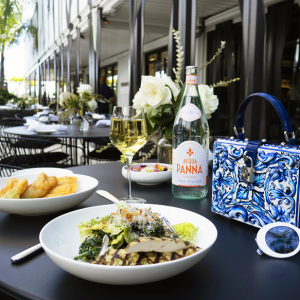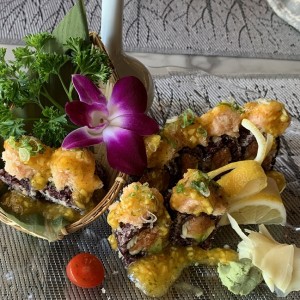Handmade tortillas warmed on the fogón, a rustic firewood stove, in Reyna Europa’s kitchen in Puebla, Mexico. As she shaped the tortillas, she tossed tomatoes, onions and peppers onto the coals. Smoke curled around the fresh veggies, roasting them until they reached chargrilled perfection. Under the inquisitive eye of her young son, Gino Calleja, Europa took the roasted ingredients and transformed them into salsa asada, the same salsa that Calleja serves today at Kolucan Mexican Bar and Grill.
“Every time I get behind the line and start cooking, I think of my mom. I remember how, with no sweat, she would prepare a meal on the spot for us to eat,” says Calleja, reflecting back on his early initiation into the culinary world. “She trusted me to cook with her. Eventually, she let me cook for my brothers and sisters. I enjoyed the creative part of it—and the fact that nobody died,” he adds. In 1986, Calleja emigrated from Puebla to New York City, following his brother and working in upscale restaurants in the Big Apple.
“There, I saw a different cuisine. It was American, but I was intrigued by how they came out with these nicely composed dishes,” Calleja says. Determined to uncover the secrets behind the final plates, he showed up to work at 6am and left at 11pm, using the extra time to practice butchering fish, opening oysters and preparing vegetables. During this period, Calleja trained under Executive Chef David Chaiken. “David said I didn’t have to be here all day, but I wanted to learn. He wouldn’t have time to teach me during service, so I would take it upon myself to be there three or four hours early when he was there,” he adds. “I remember saying, ‘I want you to teach me.’ And David said ‘I’ll teach you, but the one thing that I ask from you is that whoever asks you the same thing, you pass it on.’”

Calleja kept his word, training chefs in New York and Sarasota, where he opened two locations of Reyna’s Taqueria, named after his mom and original mentor. Intending to scale back, Calleja sold Reyna’s Taqueria on North Beneva but kept the location on South Tamiami Trail. “It was a struggle because it took a lot to build Reyna’s, but I said maybe we’ll take a little break,” he says. Calleja’s break was short-lived, for he came across an opportunity to open a new restaurant and became curious about the possibilities there. “My dream was to offer something authentic that you don’t see anywhere else. The flavors that my mom came out with were so rustic, and I wanted to bring those childhood memories here,” he adds.

Calleja partnered with fellow chef José Rojas to establish Kolucan Mexican Bar and Grill, a restaurant that weaves together both chefs’ inspirations to create a timeless yet inventive menu that celebrates tradition while catering to modern diners. The restaurant is named after the town in which Calleja and his parents were born, San Lucas Colucán. In the bright and airy restaurant space, friendly servers present dishes, remarking that Kolucan’s menu reminds them of something that their own parents would make. The salsa asada that Calleja grew up watching his mom prepare introduces guests to the culinary immersion that they’re about to experience. The smokiness of the spicy, fire-roasted salsa pairs well with the homemade tortilla chips. Patrons delight in Kolucan’s handmade corn tortillas, the blue corn variety of which accompanies the Queso Fundido, a skillet filled to the brim with Oaxaca and Chihuahua cheese, chorizo and pico de gallo. Yellow corn tortillas are served with Guacamole con Chicharrón, which comes topped with roasted pork belly, serrano toreado (pan-seared serrano chiles) and a garnish of confit tomatoes and papalo, an herb that evokes flavors of cilantro. The robust taste of the corn tortillas, almost thin enough to see through yet unyielding to fillings that would make others fall apart, complements each aperitivo.
Larger dishes, or platos fuertes, invite diners to step beyond the walls of Reyna’s kitchen and head to the nopal cactus-covered mountains of Puebla, where Calleja’s family would spend the entire day cooking and visiting. “When you go to the campo, to the mountains, it’s like camping. My mom loved it because the whole family would gather together. We would take the meats and vegetables and do a parrillada, which we serve here,” he says. Using a makeshift grill, the men in Calleja’s family would cook up the meats and vegetables, while the women made tamales and chile atole, a spicy corn soup. “We would go when the corn fields were ready to be harvested, and my mom would make tamales and chile atole right on the spot,” he adds. Kolucan’s Parrillada de Sonora pays homage to the Mexican mountains with carne asada steak, mesquite chicken breast, chorizo links, spicy shrimp, Asadero cheese, cactus, grilled onions and chile toreado. Rice, beans and warm tortillas round out the meal, which is perfect for sharing. “The parrillada became a tradition, and when we traveled to Mexico, we would let everyone know that we were coming so that they could organize it and call my aunts and uncles. Everybody would come, and we would spend the whole day there,” he says.

Other platos fuertes include Calleja’s mom’s take on cochinita pibil, a staple from the Yucatán state. Traditionally, tender pork is wrapped in banana and avocado leaves, then roasted in the ground as a base for the dish, but the team at Kolucan marinates the pork overnight, wraps it in the leaves and slowly roasts it in the oven. While much of the menu honors tradition, many of Rojas’ contributions, like the Chiles Rellenos, or poblano peppers stuffed with potatoes, mushrooms, onions, confit tomatoes and roasted carrots in a vegetable mole with cashew sour cream, adapt dishes for patrons with vegetarian and vegan needs.
The Moctezuma’s Lush, a pasilla ancho (a type of chile) chocolate cake with Abuelita’s chocolate mousse and cinnamon crème anglaise provides a sweet finish. Freshly made cocktails, like the Paloma de Hibisco or the Paloma Chula and the iconic margarita, are perfect for happy hour or after-dinner drinks. In the Frida Lounge, a separate area of the restaurant that pays homage to Mexican artist Frida Kahlo, diners can enjoy a cocktail and small bites or attend special events like wine and tequila tastings. At a table in the main dining room, lucky guests sit beside a portrait of a woman, meant to represent Calleja’s mom, standing among the nopal fields of San Lucas Colucán, gazing out at the mountains. Maybe it’s something in the salsa, the painting’s vivid colors or the knowledge that these recipes have been passed down from generation to generation, but if guests close their eyes, they might hear the smoldering of the fogón and glimpse Europa in her kitchen, tossing veggies onto the coals as her son watches, enraptured, unaware that he’s destined to craft that same culinary alchemy in a city hundreds of miles from the mountain town where it all began.










